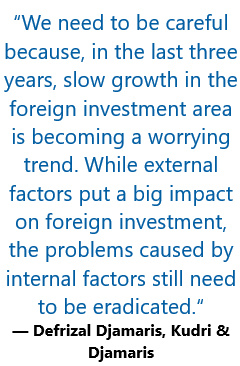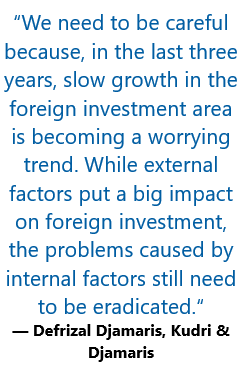
As Indonesia looks to attract more foreign investment in Jokowi’s second term, a number of measures are being proposed, including relaxations of banking rules and a new tax law. Lawyers in the country talk about what reforms they feel will be most effective.
With a population of more than 270 million and ample recourses, Indonesia has a lot to offer and thus is very attractive to foreign investors.
“However, with the vast number of sectoral departments and regional government regulations, establishing businesses and getting licenses in Indonesia may be a bit challenging. It is not uncommon in Indonesia to have overlapping regulations or inconsistency between the formal law and the policy that applies in practice,” says Luky I. Walalangi, founder and managing partner of Walalangi & Partners.
Having realised the necessity to make some changes, the Indonesian govern-ment has been working on numerous adjustments to its laws and regulations to attract more inbound investment.
“We believe that relaxation of banking rules will be a priority in the early period of Joko Widodo’s second presidential term as an option to stimulate inward investment into Indonesia economy,” says Defrizal Djamaris, managing partner of Kudri & Djamaris.
“There has been a major improvement on the simplification and harmonisation of banking licensing process and operational reporting system by the Central Bank of Indonesia (BI), where the system now seems more straight-forward after the issuance of the new regulations,” says R. Wisnu Renansyah Jenie, associate at Walalangi & Partners.
The new regulations Jenie refers to are BI Regulation No. 21/9/PBI/2019 which creates a streamlined submission process for banks to hand in reports to the government through BI’s integrated online reporting system as of August 2020; and BI Regulation No. 19/13/PBI/2017 that introduces an integrated-service facility for the licencing process between commercial banks and BI.
“Furthermore, the Financial Authority Services (Otoritas Jasa Keuangan, or OJK) is reported to be considering the relaxation of the ‘Single Presence Policy’ that requires an entity to have controlling interests in only one Indonesian bank,” says Jenie.
“If the new regulation, which provides more relaxation in banking industry, is issued, we anticipate a lot of upcoming transaction of the foreign bank to acquire local banks in Indonesia,” Meidyna Budiarti and Robert Hasan, junior partner and senior associate at Ivan Almaida Baely & Firmansyah Law Firm (IABF), tell ALB.
Foreign investments into Indonesia have been largely affected by changes in policies and laws in the past three years. Jenie says that the introduction of the Online Single Submission (OSS) System, clearer provisions on peer to peer lending (P2P) business, and the inclusion of cash lending into finance companies’ business scope have all had a positive effect on inbound foreign investment.
“With the introduction of the OSS system, most of licensing and approvals of a company will be linked altogether and it will be easier for a company to process the application of such licensing and approvals,” Budiarti and Hasan explain to ALB.
The Indonesian government is also reportedly preparing the amendment to the Negative List to allow for more relaxed provisions to foreign investors where “a more relaxed policy would enhance the investment environment”, says Anggarara Hamami, associate at Walalangi & Partners.
In September this year, the Indonesian government announced plans to draft a new law on tax provisions and facilities to boost Indonesia’s economy and attract more foreign investment. The new law will be an omnibus law which means that it will regulate several types of taxes under one law. According to the government’s statement, the omnibus law will also amend the current Income Tax Law, Value Added Tax Law, and General Tax Provisions and Procedures Law.
A highlight of the new tax law will be the new and improved ‘tax holiday’ policy that increases the tax holiday period if the investment is higher and the expansion of the industry criteria, according to Budiarti and Hasan.
“The government has revised the regulations regarding tax holiday to provide more benefits to the investors,” note Budiarti and Hasan. “The revisions to the tax holiday regulations is proved to attract more foreign investors and increase the investment percentage in Indonesia.”
Djamaris believes that another highlight of the new tax law will be the eradication on income taxes to stimu-late investment. “One way to do that is by cutting or eradicating income tax of dividend that is invested in Indonesia,” he says.
WHAT ’S NEXT
Besides the reportedly ongoing revision of the Negative List, Hamami notes that some other major reforms must be made to attract more foreign investment to Indonesia.
“Overlapping rules and regulations between intra-government agencies have proven to cause great confusions in prac-tice,” she says, mentioning that practi-tioners are keen to see changes brought by a more integrated system of regula-tions from various ministries.
The Indonesian agrarian law of 1960 generally restricts foreign ownership of land titles. “The possibility of foreigners to own land titles in Indonesia would surely improve the attractiveness of the Indonesian market to foreign investors,” says Hamami. “To address the concern of protection for small or medium-scale local enterprises, the government can set specific minimum high thresholds for foreigners to own a land title.”
 Budiarti and Hasan have also proposed some effective ways to attract more foreign investment in Indonesia.
Budiarti and Hasan have also proposed some effective ways to attract more foreign investment in Indonesia.
“The central government must liaise and communicate with the regional government to harmonise the regional regulations and central government regulations to avoid any overlapping […] so it won’t be confusing for the poten-tial investors,” the lawyers from IABF tell ALB.
They believe the government should always be one step ahead and keep updating the regulations, in particular, related to infrastructure and IT since one of the sectors Jokowi’s government wishes to expand is infrastructure and start-up companies are on the rise.
“The construction of the infrastruc-ture projects will require funding and foreign investor will be more than happy to invest if the regulations are clear and provide less complicated process to apply for approvals and licenses,” note Budiarti and Robert Hasan. “The same applies to the IT sector as nowadays start–up companies are become popular and needs good funding from the investor.”
Djamaris notes that although several key measures such as the tax stimulus package, proper education and training for better quality manpower, massive improvement on infrastructures and reform on laws and policies to provide proper legal certainty for investor have been implemented by the Indonesian government to bring in more investment, data tells another story.
“We need to be careful because, in the last three years, slow growth in the foreign investment area is becoming a worrying trend,” says Djamaris. “While external factors put a big impact on foreign investment, the problems caused by internal factors still need to be eradicated.”
He cites data from the Indonesia Coordinating Investment Board (BKPM) that shows that Indonesia suffered from slow growth partly due to dependency on export-oriented foreign investment that is very sensitive to the business climate.
Djamaris points out that the devel-opment of investment climate has not significantly improved and there are still numerous problems such as inadequate, inconsistent, and inequitable infrastruc-tures; unavailability in adequate and qualified manpower; bureaucracy mech-anism, unstable economic growth; and legal uncertainty is yet to be solved.
“We believe that Indonesia needs to focus on other different market-oriented to help combat the recent slow growth on foreign investment,” he adds.
Djamaris suggests the government to fix the problems from the ground up, such as improvement of the manpower because it is still difficult to find quali-fied workers who are ready to face the fact that the country has entered an era of globalisation.
WORK FOR LAWYERS
 With more foreign investors coming to Indonesia, lawyers will play a big role in assuring smooth transaction including the M&A, joint venture, financing for infrastructure, etc. But Budiarti and Hasan say that keeping up with regula-tory changes is always a challenge for the profession.
With more foreign investors coming to Indonesia, lawyers will play a big role in assuring smooth transaction including the M&A, joint venture, financing for infrastructure, etc. But Budiarti and Hasan say that keeping up with regula-tory changes is always a challenge for the profession.
“Our challenge as lawyers is to be always up to date with new regu-lations, and how to interpret them by discussing such regulations with the rele-vant government,” they say. “In addition, with the attractiveness of IT-related busi-nesses in Indonesia, we must also under-stand the development of technology to deliver accurate advice or produce satisfactory transaction documents for our client.”
Walalangi believes that lawyers’ worth extends beyond the legal advice they give out to the clients.
“The role of lawyers should go beyond advising the clients on the provisions of the regulations: lawyers should also navigate their clients through these challenges, including to bridge the communication between the clients and any third party and to advise them of the policies in practice and any important precedents,” says Walalangi.
Djamaris also predicts that the competition among peers will also become fiercer.
“With the improvement that is being consistently conducted by the govern-ment to attract potential investor in Indonesia, it surely will provide more opportunity for lawyers to widen their networking scope and ease their work-load,” says Djamaris. “That being said, it can also push competition to a new level.”
To contact the editorial team, please email ALBEditor@thomsonreuters.com.





